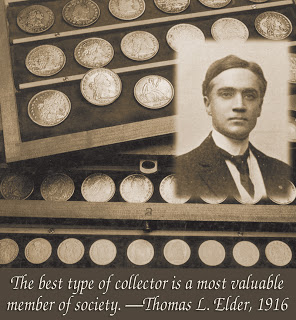
In 1916 New York City dealer Thomas L. Elder was one of the several leading American coin dealers and auctioneers. His interests were wide ranging, not only numismatics. Although he never had the time to write a book, he did pen many articles for his own magazine, for “The Numismatist” (as below), and elsewhere.
Elder was highly esteemed in his time and was considered to be among the most knowledgeable of professional numismatists. Here are some thoughts he shared way back when
Thomas L. Elder
December 1916
The best type of collector is a most valuable member of society. By the best collector I mean one whose pursuit, study and research in connection with his hobby have magnified his imaginative, aesthetic, romantic and intellectual qualities. His wide and varied experiences with various odd and interesting objects, and his painstaking care of them, have given him a remarkable fund of out-of-the-way information, as well as patience, a sense of order and practicality.
He is the finest sort of an example of the cultured and refined man. Collecting keeps people busy at odd moments, and hence keeps them out of mischief. It emphasizes in no uncertain way that keeping young is largely the result of the mental attitude, for collecting, above all other panaceas, meatless diets, and physical exercise even, keeps people young.
I have for a correspondent a man who is 94 years of age. At last report he was still riding a bicycle. At this time I am busy compiling, in conjunction with a young man [Ebenezer Gilbert] of over 82 years, a book on the United States half cents. Chauncey M. Depew at 83 has recently said: “Have some special interest apart from your business.” Collecting is the interest.
Sir Martin Conway says: "The passion for collecting must correspond with some deep-rooted instinct in man. Children of tender age often fall under its sway, and it is the last passion that still masters the very old.”
The instinct to collect is not only in many cases deep-rooted, but I venture the assertion that it is universal. It is expressed in some form by every child or adult. Even the poor, misguided miser, who enjoys the sight of his glistening gold falling through his fingers, has a few collecting instincts, such as Russell Sage and Hetty Green have expressed it after a fashion. In most people it lies dormant in the sense that we collectors know it. Does not every child have at some time an attack of the “postage stamp fever,” which, like the measles, is often soon over and forgotten? How to develop this collecting instinct, which is universal, is a matter of prime importance. It is a matter for us collectors to ponder over and put into practical working form.
In collecting small metal objects like coins or medals we have an immense advantage over the collectors of china, furniture and other cumbersome or fragile material. Our coins are indestructible, and they may be neatly laid down in small spaces in our compact cabinets. Other objects, like weapons and manuscripts, will rust or discolor unless the greatest care is used. Owning a collection which is one’s own is far better than seeing another in a museum. A good picture in our own home is of more value than a public gallery full which we may only look at.
Coins and medals are always worthy of collectors’ attention, and, contrary to the crude ideas of the public, our science is in no way an inconsequential study—and it has attracted many of the world’s best scholars and thinkers. Its close relation, since the beginning of the seventh century BC, with the best in art and sculpture, and its intimate relation to history, give it first rank among the collecting hobbies. Most Americans do not begin to realize that coin collecting is the hobby of aristocratic Europe. Kings, princes, princesses, dukes, and earls belong to the numismatic societies. And we know that the royalty have always associated with the most brilliant men and women of their time. Besides these, generals, scientists, educators, lawyers and artists of highest standing are members.





